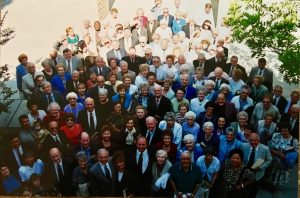Safety Second
“Lord keep us safe.”
The habitual prayer from believers and unbelievers alike. From road trips to battle lines, kids going off to school to those taking a knee before athletic events, we pray for safety. It can be a catch phrase we instinctively say and whole-heartedly mean.
Contemplating “what if” unleash waves of fear, anxiety, and worry. Our response is often to double down on pleading with God to keep ourselves and those we love free from harm.
Is it wrong to pray for safety? No, after all we are instructed to cast our cares upon Him for He cares for us (1 Peter 5:7). Neither is it wrong to be deeply concerned about safety when navigating dangerous plans or dealing with the fallen nature of our world. So why this article?
Simply put, safety is not our top priority.
Let this sink in, there is not a single prayer for safety in the New Testament. Not once does anyone or any group huddle together pleading with God to keep John the Baptist, Pricilla, Peter, Lydia, or Paul “safe.” Nothing. There are prayers for deliverance from evil, but nothing that equates to today’s avoidance of unpleasantness.
No doubt their hearts were flooded with fear, terror, grief, and worry over their circumstances. They felt the real-time implications of living for Christ in a world filled with unrestrained hatred toward God. They were truly sheep in the midst of wolves. If anyone had reason to make that request prominent in prayer, it was the persecuted church.
Yet we do not find them praying for God to evacuate them to a place of comfort, ease, and absent from hardship.
The only time I find Paul using the word is in 2 Timothy 4:18 and the context is Jesus bringing him safely through death’s door into Heaven. The Lord will rescue me from every evil deed, and will bring me safely to His heavenly kingdom; to Him be the glory forever and ever. Amen.
There are a few such prayer for God’s protection in the Old Testament {Ex: Psalm 4:8; Psalm 32:7; Psalm 78:53; Isaiah 38:14}. Yet very seldom do we see it prioritized even under extreme persecution. Think of all we know of Daniel, Job, Esther, Ruth, Jeremiah, David and many others. With all the soul-crushing emotions they carried, the overwhelming majority of their prayers are focused on something other than personal well-being.
What do we find believers praying for?
- Open doors for the gospel – Colossians 4:2-4
- Courage – Ephesians 6:19-20
- Alert, sober-minded – 1 Peter 4:7
- Love that is discerning – Philippians 1:9
- Steadfastness – 2 Thessalonians 3:3
- Filled with endurance, faith, and love – Ephesians 3:16-19
- Holiness – 1 Thessalonians 3:13
- Wisdom – James 1:5
- Salvation – Romans 10:1
- Protection from evil – Matthew 6:14
- Equipped for service – Hebrews 13:20–21
- Righteousness – 1 Peter 3:10
- Delivered from persecution in order to proclaim the gospel – Romans 15:31
- Worthy walk, Godly desires, Powerful faith – 2 Thessalonians 1:11-12
The argument from the negative doesn’t necessarily create a mandate. Yet the overwhelming majority of prayer modeled in the Scripture are concerned with glorifying God far more than soothing ourselves. In following this thread, we find how to petition God for the character needed to endure persecution. Certainly peace is desirable, but the peace God promises is the realty of Christ in us (Ephesians 2:14) and the calming assurance we have that He is absolutely sovereign over all things, working everything together for good (Romans 8:28) The peace He promises isn’t from avoidance of persecution, but from His presence with us in the valley of the shadow of death (Psalm 23, Hebrews 13:5,6).
Our prayers must reflect God’s priority. Jesus said it this way, If you love Me, you will keep My commandments (John 14:15). The entire focus of a Christian’s life is on glorifying God through joyful, humble obedience to Christ.
God is far more concerned with our holiness than with our health, our love than longevity, our character more than our comfort, our sanctification than with our safety. Not even Jesus during His earthly ministry prayed for His personal protection. When teaching us to pray, Jesus said…lead us not into temptation, but deliver us from evil (Matthew 6:13). That deliverance is not from potential physical harm, though it may include it, but from the impact of devastating sin in our lives.
The same thought is repeated when Christ prayed, I do not ask You to take them out of the world, but to keep them from the evil one (John 17:15). The protection we plead for is the calming assurance Paul speaks of in 2 Thessalonians 3:3, But the Lord is faithful, and He will strengthen and protect you from the evil one.
If safety is our top priority, worship can become our greatest neglect.
How can we say along with Christ Your will be done (Matthew 5:) if what we actually mean is, as long as it does impede my quality or quantity of life. It’s hard to imagine the three Hebrew standing before Nebuchadnezzar ’s idol refusing to compromise God’s glory, if their hearts were even slightly concerned with their safety.
Our concern for safety stunts our obedience to the Great Commission, and willingness to suffer for righteousness. When self-preservation is our first priority, we engage unbelievers when the potential outcome leaves us with comfortable results. The call to missions is ignored, the fields white for harvest are abandoned and the pathway to hell is left unobstructed all because Christians place their temporary quality of life above the eternal priority of proclaiming Christ. We can not seek first His kingdom (Matthew 6:33) while seeking first our tranquility.
If our prayers reveal our priorities, then elevate our prayers for holiness, courage, faithfulness, humility and move our prayers for safety to second place. It’s isn’t wrong to put that before God, just don’t make an idol out of safety.
After all, God controls the day of our death (Psalm 139:16, Job 14:5). That has already been established long ago. Nothing we do changes that appointed date (Matthew 6:27). So live in the freedom of one who has already died, and your life is hidden with Christ in God (Colossians 3:3). Pray that we use whatever time we have on earth to do our Father’s will, show His kindness to this unbelieving world and call everyone we find to repentant and believe in Christ.
Studdard Kennedy served as a chaplain during World War 1. From the front lines he wrote this powerful statement to his family:
The first prayer I want my son to learn to say for me is not
“God keep daddy safe,” but “God make daddy brave,
and if he has hard things to do make him strong to do them.”
Life & death don’t matter … right & wrong do.
Daddy dead is daddy still, but daddy dishonored before God
is something awful, too bad for words.
I suppose you’d like to put in a bit about the safety too, old chap, & mother would.
Well, put it in, but afterwards, always afterwards, because it does not really matter near so much.
So pray for safety, but put it second.

